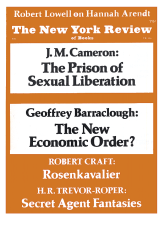In response to:
Cutting Classes from the March 4, 1976 issue
To the Editors:
…I ask Professor Hacker to recognize the difference between white ethnics and Indians and mestizos (Indian mixed with something else). We are and continue to be poor and powerless, even those of us who by virtue of an education might be placed in the middle or upper class. Our families remain poor and we remain powerless in the educational and political institutions which employ and disemploy us. America remains unabashedly assimilationist, not integrationist. Even a redistribution of income and property would not alter that fact. One cannot retain more than superficial ethnicity in America whether one is in the upper or lower class. Perhaps this is so because America’s lower-class people do not really see themselves in this lowly status and instead consider themselves allies with or part of the great middle class. People who are visibly different in looks, actions, or speech become the lower class. Yet I would agree with Professor Hacker that the poor of America have much in common with the lowly minorities. But until these people recognize this fact, Chicanos and Native-Americans will have to seek their own solutions and their own ways toward the future. There are many differences between Anglo and Chicano professors (for example), particularly in how we define our solutions and our future. There are even more pronounced differences in our past.
Adaljiza Sosaz Riddell
University of California Davis
Andrew Hacker replies:
What can Michael Novak possibly mean when he says that “ethnicity is a more cogent way of talking about class”? When faced with coalminers or truckdrivers, his first impulse is to divide them up according to whether they’re Armenian Catholics or Appalachian Baptists. No one denies cultural diversity, or what Novak calls “symbol systems.” But to dwell on variations in dress and diet is anthropology: essentially a conservative science, particularly as it diverts attention from power. Somehow I can’t take seriously Novak’s call for a “coalition” of non-executive ethnics, storming boardrooms to the cry of “à bas les Episcopals!” (Will they amnesty insurance companies, which have traditionally been tolerant toward Catholics?)
Confusing Slovenes and Slovaks was an inexcusable error, for which I apologize.
This Issue
May 13, 1976



